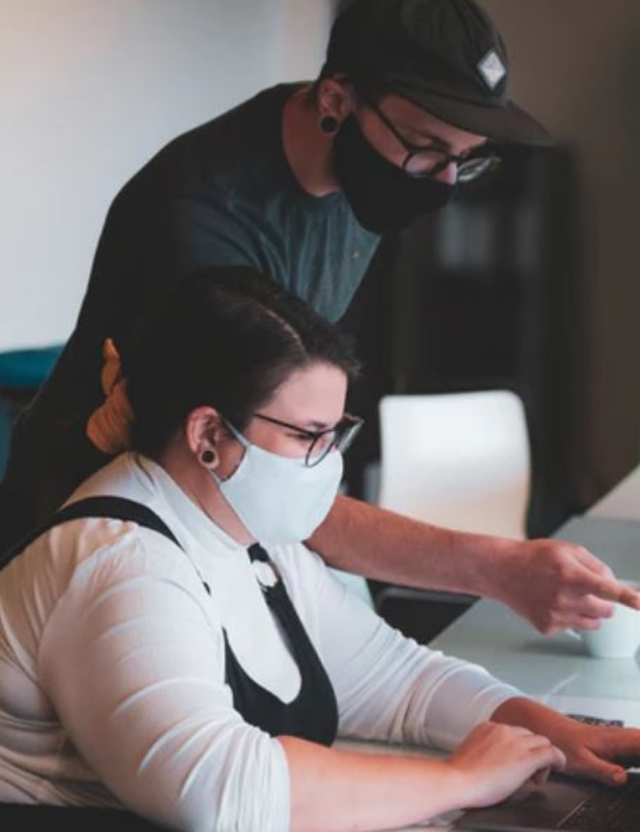Supporting Health Departments in Communicating About Equity During a Pandemic
Program
-
Focus Areas
Communicable Disease Prevention -
Expertise
Media Advocacy & Communications -
Strategic Initiatives
COVID-19, Vaccine Access & Equity

In 2020, PHI’s Berkeley Media Studies Group (BMSG) worked with local health departments across California to enhance their capacity to communicate effectively about COVID-19 to policymakers, the public, and California families and communities most at risk from COVID, with the aim of addressing racial and health inequities during the pandemic.
In this project, BMSG worked closely with the Bay Area Regional Health Inequities Initiative (BARHII), the Public Health Alliance of Southern California (the Alliance), and the San Joaquin Valley Public Health Consortium (SJVPHC) to develop communication strategies and implement communication tactics.
Through this process, BMSG supported the regional organizations and the local health departments and partners they work with to develop COVID related materials.
These tools include:
- Communicating about the COVID-19 vaccines: Guidance and sample messages for public health practitioners
- Tips for communicating about masks in the midst of misinformation
- Blog: Communicating about housing and COVID-19: Tips for responding to reporters
- Communicating about racial equity and COVID-19: Connecting data to context
- Talking about health, housing, and COVID-19: Keeping equity at the forefront
- COVID-19: Addressing discrimination and racism: Local health department support guidance
Additionally, as public health funding and infrastructure are critical during COVID-19 and beyond, BMSG worked with the Alliance to develop talking points to accompany the Investing in Our Local Health Departments brief and collaborated on the statement When the Truth Becomes the Threat: Standing in Support of our Public Health Officials.
BMSG also worked with the regional organizations to gain media coverage in several news outlets, including several media stories and op-eds that strategically featured community-based organizations and coalitions. Some of the coverage included:
- Two Alameda County Supervisors: We must come together to halt evictions and foreclosures, San Francisco Chronicle, by Alameda County Supervisors Keith Carson and Wilma Chan
- Solano Voices: Protect public health, housing stability in Solano, Daily Republic, by Cristal Little, an organizer with the Vallejo Housing Justice Coalition
- David Lindsay, Common Ground: Support for rent protection, Solano Times Herald, by David Lindsay of Common Ground.
- Common Ground spearheads Solano County COVID tenants’ rights resolution, Benicia Independent, Common Ground
- Opinion: We still need an immediate statewide eviction moratorium, San Francisco Examiner, by Peter Cohen, Cesar Covarrubias and Chione Flegal.
- 2008 was a disaster. Here’s how California should respond to save its affordable homes, Next City, by Heather Hood, Peter Cohen and Lisa Hershey.
- The COVID-19 pandemic has a new victim: Undocumented women in abusive relationships, The Fresno Bee, Genoveva Islas.
Additionally, as state eviction protections were complex, BMSG and its partners were concerned that many reporters’ news coverage was inaccurate and gave the public and elected officials the false impression that tenants across the state were protected from evictions. In fact, state policy at the time only allowed local jurisdictions to offer protections, but provided no requirement for eviction protections.
To correct this misinformation and provide reporters with a broad range of community-based and equity-focused sources, BARHII, BMSG, and partners held an online reporter roundtable on “Bay area community stories on housing, health, and COVID-19.” The event featured speakers from BARHII, housing and tenant rights organizations, and legal services organizations in the North, South, and East Bay as well as San Francisco. Reporters from 15 local and national news outlets, including the San Francisco Chronicle, Wall Street Journal, and New York Times attended, and several Roundtable speakers were quoted in follow-up news stories.
Based on this success, BMSG supported BARHII and its partners in developing a reporter roundtable on “A Black-Led COVID-19 Recovery,” with speakers from BARHII and organizations focused on education, Black business development and support, housing, youth organizing and leadership, police violence, ending discrimination in housing for people who have been incarcerated, and protecting Bay area transit workers from COVID-19. Reporters from 13 news outlets attended, generating the following coverage:
- Oakland organization focuses on struggles of Black-owned businesses amid pandemic, San Francisco Chronicle
- Bay Area Black community leaders envision equitable coronavirus response, San Francisco Public Press
BMSG also supported BARHII in developing and pitching op-eds on essential worker protections that were published in local news outlets, including:
- Opinion: This Labor Day, we owe a special debt to essential workers, East Bay Times
- Our second chance with COVID-19, California State Association of Counties
Work With Us
You change the world. We do the rest. Explore fiscal sponsorship at PHI.
Support Us
Together, we can accelerate our response to public health’s most critical issues.
Find Employment
Begin your career at the Public Health Institute.
